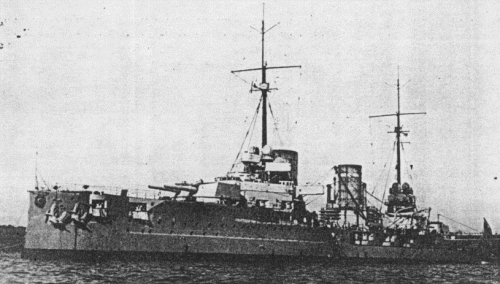

Von der Tann 1914
| Name | No | Yard No | Builder | Laid down | Launched | Comp | Fate |
| Von der Tann | 198 | Blohm & Voss, Hamburg | 25.3.1908 | 20.3.1909 | 19.2.1911 | interned 11.1918, scuttled 21.6.1919 |
|
Displacement normal, t |
19370 |
|
Displacement full, t |
21300 |
|
Length, m |
171.7 oa 171.5 wl |
|
Breadth, m |
26.6 |
|
Draught, m |
8.91 mean 9.17 deep load |
|
No of shafts |
4 |
|
Machinery |
4 Parsons steam turbines, 18 Marine doubled boilers |
|
Power, h. p. |
42000 |
|
Max speed, kts |
24.8 |
|
Fuel, t |
coal 2600 |
|
Endurance, nm(kts) |
4400(14) |
|
Armour, mm |
belt: 250 - 80, bulkheads: 180 - 100, deck: 50 with 50mm slopes, turrets: 230 - 60, barbettes: 230 - 30, casemates: 150, CT: 250 - 80, torpedo bulkhead: 25 |
|
Armament |
4 x 2 - 283/42 SK L/45 C/07, 10 x 1 - 149/42 SK L/45 C/09, 16 x 1 - 88/45 SK L/45 C/13, 4 - 450 TT (1 bow, 2 beam, 1 stern) |
|
Complement |
923 |
Project history:
This ship, the first German battlecruiser and built under the 1907-8
programme, was a considerably better fighting ship than any of the 6 British
305mm gun battlecruisers. There was a short forecastle extending to the foremast
and at normal load freeboard was about 8.1m forward and 5.8m amidships and aft.
GM is given as 2.11m and Frahm anti-rolling tanks were fitted during
construction, but were later used to take 200 tons of extra coal, and bilge
keels fitted instead. Fighting draught was less than deep load and was 8.8m with
displacement 21,082 tons.
The main turrets were disposed fore and aft with 2 echelonned
amidships, the latter being sufficiently far inboard to give a 125° arc on the
opposite beam. The long trunk Drh LC/07 mountings allowed 20° elevation and
magazines were above shell rooms except in the after turret. The 15cm were in a
main deck battery and the TT at bow, stern and on either broadside forward of
the torpedo bulkhead.
There were 10 boiler rooms and 4 engine rooms with the main
high pressure turbines on the wing shafts in the 2 forward rooms and the main
low pressure on the inner shafts in the 2 after ones. Boiler pressure was
16.5kgf/cm2, and about 200 tons tar oil was later carried for
spraying on the coal in the boiler furnaces. As usual the boilers were heavily
forced on the mile and trial figures were 79,000shp = 27.4kts.
Ship protection: The main belt ran from the forward edge of the fore barbette to a little past the after one and was 250mm for 0.9m above and 0.4m below lwl, tapering to 150mm at the main deck and lower edge 1.6m below lwl. Forward to the bows it was 120-100mm and aft 100-80mm. The barbettes were 230-170mm above the hull armour but behind the battery and main belt were drastically reduced to 30mm while the turrets had 230mm faces and rears, 180mm sides and 90-60mm roofs. The armour deck was 25mm behind the main belt with 50mm slopes and 50mm forward while aft it was 80mm with 50-25mm slopes. The main deck was 25mm over the belt outside the battery, the upper deck 25mm over the battery and the forecastle deck 23mm round the fore barbette. The torpedo bulkhead was 30-25mm and about 4.0m inboard amidships, running for the same length as the main belt.
Modernizations: 1915: - 4 x 1 - 88/45; + 4 x 1 - 88/45 SK L/45 C/13 (AA)
1916: - 12 x 1 - 88/45
Naval service: At Jutland she blew up Indefatigable in the first 14 or 15 minutes and was later hit by 2 381mm and 2 343mm shells which caused damage aft and put two turrets out of action while troubles in the other two caused the ship to be without any heavy guns for 11.4 hours. The Von der Tann was raised at Scapa Flow on 7 December 1930 and broken up at Rosyth in 1931-34.

Von der Tann 1914
© Ivan Gogin, 2014